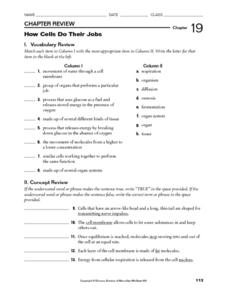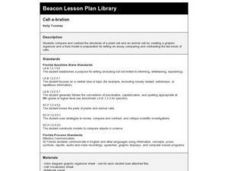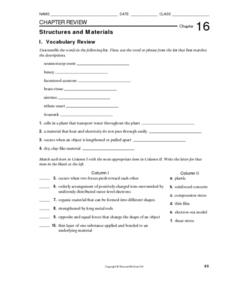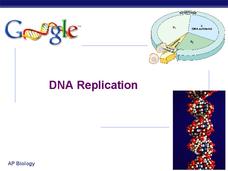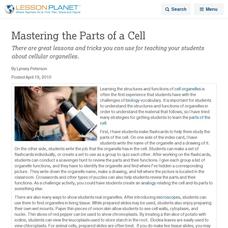Virginia Department of Education
Prokaryotes
Lead your biology class on a cell-sized adventure! Emerging scientists construct models of prokaryotes, then design an experiment to properly grow a bacterial culture. They conclude the activity by viewing the culture under a microscope....
Biology Junction
Enzymes
Many people know enzymes help with digestion, but few realize enzyme production decreases with age, making it more difficult for bodies to digest certain foods. A worksheet offers 28 fill-in-the-blank and short-answer questions over...
Curated OER
How Cells Do Their Jobs
In this cells worksheet, students will review cell characteristics and structure and different types of cells and what role they play in the body. Students will investigate experimental results of the influence of sucrose on the...
Curated OER
Cell-a-bration
Fifth graders study the structures of a plant cell and animal cell. They create a graphic organizer and a food model. Finally, they write an essay comparing and contrasting plant and animal cells.
Curated OER
Plant Cells and Tissues
In this plants worksheet, students review 17 vocabulary words associated with the different types of plant cells and tissues. This worksheet has 17 matching questions.
Curated OER
A View of the Cell
For this cell worksheet, students will match 13 vocabulary words relating to cells to the correct definition. The cell vocabulary words cover all the parts of the cell plus eukaryotes, and prokaryotes.
Curated OER
Structures and Materials
In this materials learning exercise, students will review different types of materials and the structures that can be made using these materials. This learning exercise has 7 fill in the blank, 6 matching, 1 short answer, and 6 multiple...
Curated OER
Extensions - Biology Review Unit
Middle schoolers engage in a variety of activities in order to review a Biology unit. For example, they research the Bird Flu, it's history, how it is spread, what has been done about it, what better options exist for controlling or...
Curated OER
DNA Replication
An excellent review of the very specific stages of mitosis, the detailed slides start with explanations of the directionality of DNA and then develop the concept of daughter strands. The intricate diagrams are intended for experienced...
Curated OER
Genetics - Critical Thinking
In this genetics worksheet, students review terms and processes associated with genetics. This worksheet has 2 multiple choice and 21 matching questions.
Curated OER
Biotechnology
The intricate details of DNA structure and the double helix are covered in this presentation. Many details about chemical behavior are also explained which will help your students review DNA. Many of the slides are summaries and the 37...
Curated OER
Chemistry of Carbon - Building Blocks of Life
A great review of the structure and function of carbon-based molecules important to life, especially with relevance to humans. The chemistry behind the combination of polymers and the breakdown of bonds is covered. Valuable content in...
Curated OER
Blood Vessels
A series of diagrams and photographs is a vivid tool for delivering a lesson about blood vessels. Each slide has notes for the lecturer to use to explain each slide. Your young biologists will increase their understanding of the...
Curated OER
Mastering the Parts of a Cell
There are great lessons and tricks you can use for teaching your students about cellular organelles.
University of Minnesota
Dendritic Spines Lab
This is your brain on drugs ... literally! Your neuroscientists-in-training examine the evidence of drug use on the human brain and how neurons change their connectivity when altered by drugs. They then work together to create testing...
Curated OER
Teaching Biology Through Bioinformatics
Wow! A very detailed slideshow covers complex topics of genome research methods. This is advanced and relevant to the highest level of school biology. Excellent resource if you wish to expose your class to scientific methods and...
The New York Times
Sequencing the Stages: Understanding H.I.V. Infection at the Molecular Level
How does HIV operate at the molecular level? Pupils discover the progression from a healthy immune cell to one infected with HIV, watch an animation of the HIV life cycle, and finally identify each of the stages with illustrations on...
Curated OER
Standard 4 Review Sheet-Genetics and Inheritance
In this genetics worksheet, students answer a variety of questions about inheritance, DNA, the genetic code, genes, sexual and asexual reproduction, mutations, protein synthesis and genetic engineering.
Curated OER
The Chemistry of Life
In this chemistry of life worksheet, students will review key terms of plant cell structure and chemistry by reading 13 clues to complete the puzzle. Word bank is included.
Curated OER
Pond 2: Life in a Drop of Pond Water
Students observe organisms found in pond water with a microscope. In groups, they discuss how single-celled organisms satisfy their needs for food, water and air. They compare and contrast the needs of macroscopic and microscopic...
Curated OER
The Brain’s Inner Workings
Do you want to learn about how you learn? Help pupils become the best learners they can be by teaching them how their brain works. The resources available include videos about brain structure and a study guide full of activities that...
Curated OER
Mathematics in Bioengineering: Its Application for Today's Students
High schoolers explore the different fields of bioengineering. They will create and interpret graphs from cancel cells data. They then calculate the amount of drugs found in blood and eliminated by the body over time.
Curated OER
Active Transport
In this active transport worksheet, students review the cellular process of active transport including the structures and functions of the cell organelles involved. This worksheet has 28 fill in the blank statements.
Curated OER
Who Wants to be a Cellular Biologist?
Eighth graders review concepts in cellular biology. In this biology lesson, 8th graders play an interactive game based on the idea of winning money. They discuss misconceptions about the topic.




